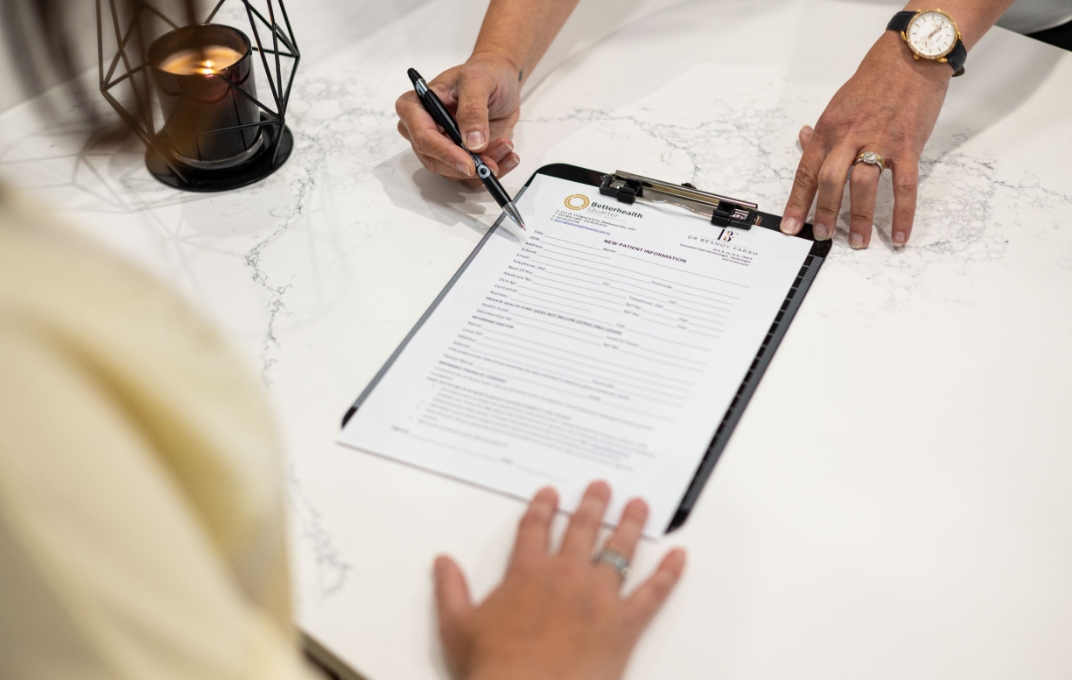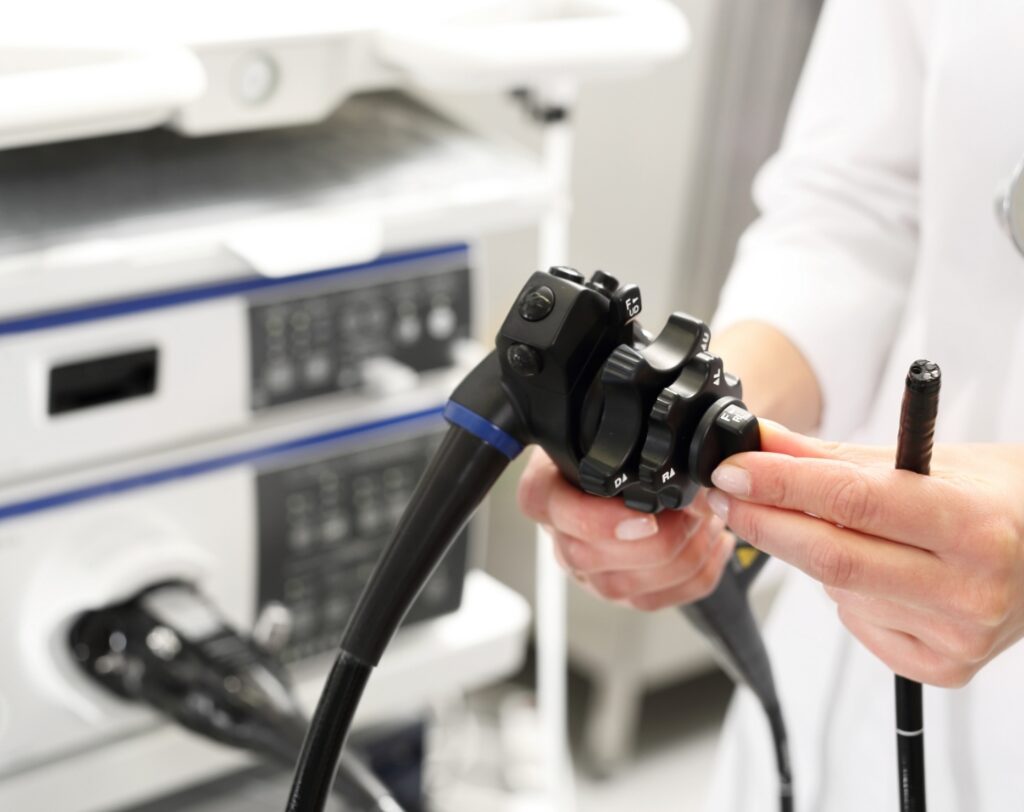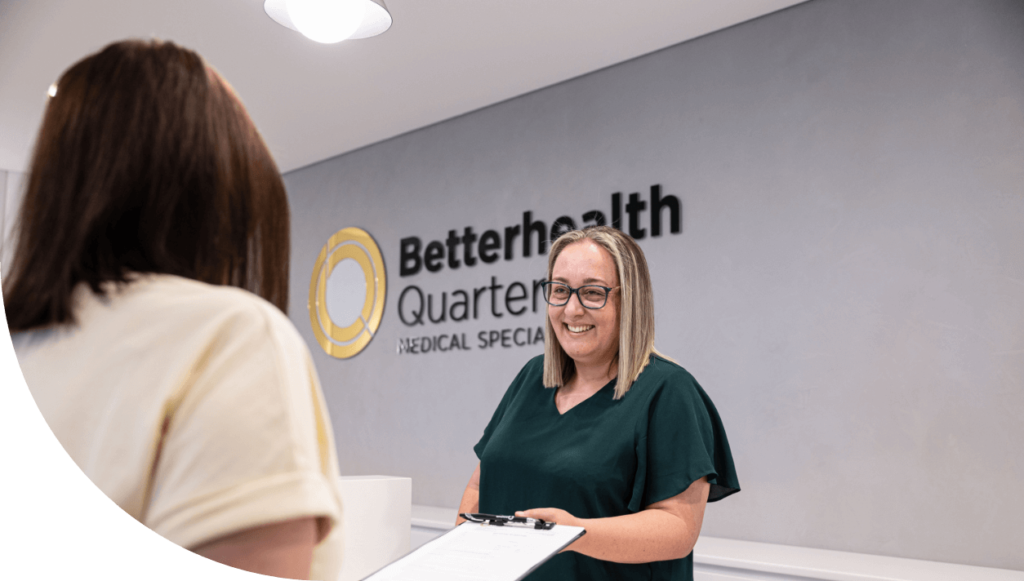Colonoscopy
Overview

A colonoscopy is an exam of the lower part of the gastrointestinal tract, which is called the colon or large intestine (bowel). Colonoscopy is a safe procedure that provides information other tests may not be able to give.
Colonoscopy is performed by inserting a device called a colonoscope into the back passage and advancing through the entire colon. The procedure generally takes between 20 minutes and one hour.
Reasons For Colonoscopy
- To screen for colon polyps (growths of tissue in the colon) or colon cancer
- Rectal bleeding
- A change in bowel habits, like persistent diarrhea
- Iron deficiency anemia (a decrease in blood count due to loss of iron)
- A personal or family history of colon polyps or colon cancer
- Chronic, unexplained abdominal or rectal pain
- An abnormal x-ray exam, like a barium enema or CT scan
Colonoscopy Preparation

Before colonoscopy, your colon must be completely cleaned out so that the doctor can see any abnormal areas. This is vitally important to increase the chances that your doctor will identify abnormalities in your colon. If your colon is not completely cleaned out, the chances your doctor will miss abnormalities increases.
Dr Farah will provide specific instructions about how you should prepare for your colonoscopy. Be sure to read these instructions as soon as you get them so you will know how to take the preparation and whether you need to make any changes to your medications or diet. If you have questions, call the office in advance.
You will need to avoid solid food for at least one day before the test. You should also drink plenty of clear fluids on the day before the test. You can drink clear liquids (a liquid you can hold up to the light and see through) up to several hours before your procedure, including:
- Water
- Clear broth (beef, chicken, or vegetable)
- Coffee or tea (without milk)
- Ices
- Gelatine such as Jell-O (avoid red gelatine)
You will need to avoid drinking red liquids. You may also be asked to avoid high fibre foods including seeds and nuts for the week before the procedure.


To clean the colon, you will take a strong laxative and empty your bowels. You may be asked to take the entire preparation the night before the test, or you may be asked to take it in two doses, with the second dose taken four to six hours prior to the colonoscopy. Taking the preparation in two “split” doses may help get the colon even cleaner.
This may require you to wake up early in the morning to complete the preparation. The instructions you are given will tell you how you should take the preparation.
Preparation solution is purchased at the pharmacy with a prescription. There are several regimens on the market.
Refrigerating the solution can make it easier to drink, but do not put ice in the solution since it will melt and you will have to drink even more fluid. Drinking the solution through a straw, adding sugar-free powdered flavour packets, and taking half the preparation the night before and the other half later (four to six hours before your colonoscopy) may also make it easier to drink.
Drinking this solution may be the most unpleasant part of the exam. Watery diarrhea is the desired result. This may occur shortly after drinking the solution or may be delayed for several hours. The end result should be diarrhea that looks like urine. If you become nauseated or vomit while drinking the solution, call our office for instructions.
Tips that can help with nausea and vomiting include temporarily stopping drinking the solution, walking around, and resuming drinking at a slower pace.
You can take most prescriptions and non-prescription medicines right up to the day of the colonoscopy. Dr Farah should tell you what medicines to stop. You should also inform him if you are allergic to any medicines.
Some medicines increase the risk of heavy bleeding if you have a polyp removed during the colonoscopy. Examples include Warfarin, Clopidogrel, Fish Oil or any other anticoagulant (blood thinning) medicine. Ask Dr Farah how and when to stop these medicines. DO NOT stop these medications without first talking with your doctor.
Most patients are given a sedative (a medicine to help you relax) during the colonoscopy, so you will need someone to take you home after your test. Your doctor may prefer that an anaesthesiologist administer the sedative and monitor you during the colonoscopy.
Although you will be awake by the time you go home, the sedative/anesthetic medicines cause changes in reflexes and judgment that can interfere with your ability to make decisions, similar to the effect of alcohol. You will not be able to drive home or go back to work after the examination if you received sedation for the procedure. You should be able to return to work the next day.

Call us today for an appointment at Gledswood Hills or Shellharbour
What To Expect

Prior to the colonoscopy, the staff will review your medical and surgical history, including current medications and allergies. Dr Farah will explain the procedure and ask you to sign a consent. Before signing consent, you should understand the benefits and risks of the procedure, alternatives to the procedure, and all of your questions should be answered.
Your vital signs (blood pressure, heart rate, and blood oxygen level) will be monitored before, during, and after the examination.
An intravenous line (a needle inserted into a vein in the hand or arm) will be inserted to deliver medications. You will be given fluids and medicines through the IV line. The anaesthesiologist will give you an anaesthetic agent (for example Propofol) and will put you to sleep while you are being closely monitored.
The Colonoscopy Procedure
The colonoscope is a long black flexible tube, approximately the diameter of the index finger. The doctor will gently pump air or carbon dioxide and sterile water or Saline through the scope into the colon to inflate it and allow the doctor to see the entire lining.
You might feel bloating or gas cramps as the air opens the colon. Try not to be embarrassed about passing this gas (it is just air), and let Dr Farah know if you are uncomfortable. You may feel like you have to go to the bathroom, which is a normal feeling during the procedure.
During the procedure, Dr Farah might take a biopsy (small pieces of tissue) or remove polyps. Polyps are growths of tissue that can range in size from the tip of a pen to several inches. Most polyps are benign (not cancerous). However, some polyps can become cancerous if allowed to grow for a long time. Having a polyp removed does not hurt.
Recovery From Colonoscopy
After the colonoscopy, you will be observed in a recovery area, usually for about 30 to 60 minutes until the effects of the sedative medication wear off. The most common complaint after colonoscopy is a feeling of bloating and gas cramps. You should pass gas and not feel embarrassed doing this either during or after the procedure.
This will relieve your feelings of bloating and cramping. You may also feel groggy from the sedation medications. You should not return to work, drive, or drink alcohol that day. Most people are able to eat normally after the test. Ask Dr Farah when it is safe to restart Aspirin and other blood-thinning medications.

Colonoscopy Complications
Colonoscopy is a safe procedure, and complications are rare but can occur:
- Bleeding can occur from biopsies or the removal of polyps, but it is usually minimal and can be controlled.
- The colonoscope can cause a tear or hole in the colon. This is a serious problem that sometimes requires surgery to repair, but it does not happen commonly.
- It is possible to have side effects from the sedative medicines like nausea or vomiting.
- Although colonoscopy is the best test to examine the colon, it is possible for even the most skilled doctors to miss or overlook an abnormal area in the colon.
You should call your doctor immediately if you have any of the following:
- Severe abdominal pain (not just gas cramps)
- A firm, bloated abdomen
- Vomiting
- Fever
- Rectal bleeding (greater than a couple of tablespoons [30 mL])
After Colonoscopy

Although many people worry about being uncomfortable during a colonoscopy, most people tolerate it very well and feel fine afterward. It is normal to feel tired afterward. Plan to take it easy and relax the rest of the day.
Dr Farah can describe the results of the colonoscopy as soon as it is over. If he took biopsies or removed polyps, you should call for results within one to two weeks if he has not already contacted you.